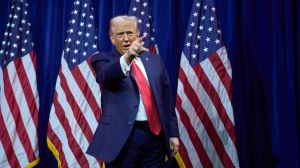Credibility crisis on the Net
It is very fitting that discussions that could change the face of the World Wide Web are being held in Geneva, the birthplace of the Intern...

It is very fitting that discussions that could change the face of the World Wide Web are being held in Geneva, the birthplace of the Internet. And it is especially fitting that the people piloting the meet have no problems about getting ahead with the future while tugging their forelocks to time. The Internet is coming of age, and it8217;s time everyone grew up. Said Don Heath, president and CEO of the Internet Society ISOC, at the meet: quot;The Internet has reached its present robust state for many reasons: a brilliant protocol; an early foundation period when participants were virtually unnoticed and so, were allowed to make great progress with minimal interference.quot; The pioneer spirit having been propitiated, however, International Telecommunications Union Secretary-General Pekka Tarjanne warned that it was time for change. quot;Let me assure you,quot; he said, quot;if you think that finding a resolution to DNS problems is hard, just wait until you see the problems lurking around the corner associated with electronic commerce and Internet content.quot;
The problem at hand over DNS refers to the proposal of the Internet international Ad-Hoc Committee IAHC to institute new generic top-level domain gTLD, over and above the corrent .org, .net, .gov and .com. These no longer suffice to indicate the sort of content the hosts might hold, because of the sheer multiplicity of services online. According to a survey projection published by ActivMedia last week, Web-mediated sales will touch 1.5 trillion in 2002, about 3 per cent of the combined GDP of the world8217;s nations. That8217;s a lot of companies online. So an art dealer, for instance, would be more likely to attract business with a .art domain name than with a plain old .com. But making connections is only one of the functions of the Web. Seeing that they go through in good spirit is equally important. That is the area that Tarjanne was referring to in his caveat, and the ridiculous case of Pooja Bhatt only goes to show how serious the problem might be. Don Heath8217;s pioneers, who could work with quot;limited interferencequot;, have now been replaced by bigger operators. To a great extent, it is the market, not core Internet operators, who set the agenda these days. That isn8217;t a very happy state of affairs. A credibility problem, fuelled by a sort of frontier ethic, has always been integral to the Internet. Pretending to be someone else in the real world is referred to as 8216;impersonation8217;, a word usually found in criminal procedure codes. On the Internet, it8217;s just good fun, like when a fat accountant puts up a macho football star8217;s picture on his personal home page and captions it with his own name. Or when someone on a California campus doctors a picture of Pooja Bhatt and passes it off as an original. It8217;s, quot;Hey, did you seriously believe it was for real?quot; Businesses worldwide suffer a similar credibility problem, because a good number of them have been caught marketing vapourware somewhere down the line. So when a firm especially one that8217;s low on brand awareness goes online, its headaches are doubled. The Californian Website bollywood.com is was? a purveyor of, among other things, digital double-dealing. The better-known hollywood.com, on the other hand, carries some of the finest material on the US entertainment industry. The trouble is, how is the consumer to figure out the credibility of each the first time he happens upon them? It8217;s a pity, because the Internet cannot be a truly powerful business medium unless it can handle complete transactions. Today, two companies who meet on the Net have to suss each other out by sending representatives over before they can establish comfort levels. Hopefully, when the domain name system is made more formal and transparent, they will have the confidence to use just the mouse to make contact, not their travel agent.
- 01
- 02
- 03
- 04
- 05































